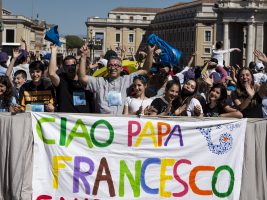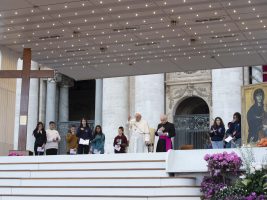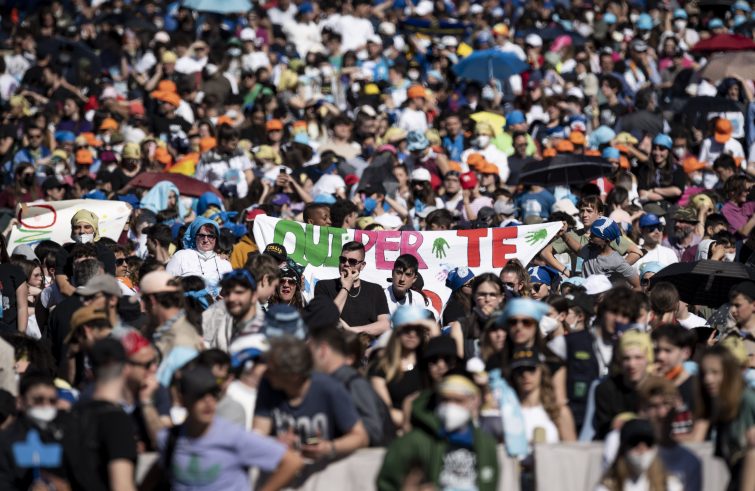
“The Church is very much alive, as demonstrated by 100,000 teenagers who flocked to St Peter’s Square to meet Pope Francis on Easter Monday. These young people have surprised us also for their keenness to come together, to meet each other, overwhelmingly exceeding all our expectations.” Father Michele Falabretti, head of the National Youth Ministry Service (SNPG) of the Italian Episcopal Conference, offers an account of the event “#Follow me”, the pilgrimage of Italian teenagers gathered in Rome “to participate in a shared occasion for listening and prayer” with Pope Francis. The event preceding the meeting with the Pope was conducted by Andrea Delogu, together with Gabriele Vagnato, with contributions from Giovanni Scifoni, Michele La Ginestra and Matteo Romano.
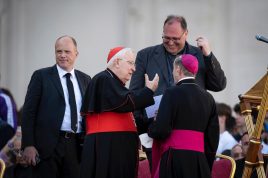 Father Falabretti, what impressed you the most about the meeting with this multitude of teenagers?
Father Falabretti, what impressed you the most about the meeting with this multitude of teenagers?
What really surprised me, and not only me, was the young people’s re-reading of the Miraculous Catch of Fish narrated in the Gospel of John. They offered their accounts, speaking from the heart, showing that they have a greater inner depth than we might think. They know how to express it and, when they are free to do so, their ability to attract adults’ attentiveness is astonishing. Some of the bishops who were listening to them were moved. I was touched by their depth and composure before certain themes that resounded in St Peter’s Square. Even the silence in the square at certain meaningful moments, such as during the Pope’s message, was truly awe-inspiring.
The purpose of this event, the first after the pandemic, was to restore due attention to the younger generation, which has suffered so much over the last two years. In this regard, what is the legacy of this meeting for educators and adults?
I will answer this question with the words of a Neapolitan pastoral minister, Msgr. Luigi Pignatiello. He said that children are not just the recipients of a proclamation, they are active agents of the life of the Spirit, they participate in this life together with adults.
The Gospel cannot only be proclaimed top-down.
To listen and to accompany are two key terms which were given much consideration in the Synod for young people four years ago. By listening, the teacher, i.e. adults – be they bishops, priests, clergy or educators – can offer a more credible testimony precisely because they are touched by the young people’s testimony. This is when the teacher ‘confirms’ the faith of young people, as Jesus did with Peter, in the knowledge that confirming does not mean excluding.
Should we know how to listen to them before speaking to them?
We cannot expect to speak to them, to persuade them with words, if we are not disposed to listen to them first, with no intention of judging their world. In this respect, Blanco is a gift received and subsequently offered to the young.
- (Foto Siciliani-Gennari/SIR)
- (Foto Siciliani-Gennari/SIR)
- (Foto Siciliani-Gennari/SIR)
- (Foto Siciliani-Gennari/SIR)
- (Foto Siciliani-Gennari/SIR)
- (Foto Vatican Media/SIR)
During the pandemic, a sort of ‘De profundis’ for the Church was echoed from many quarters. The teenagers’ pilgrimage has proved otherwise, hasn’t it?
This pilgrimage has shown us that the Church is far from over and done with. The pandemic was a serious trial for everyone. The suspension of the liturgy, our various religious venues – parishes and oratories – necessarily without people – made us fear that nothing would ever be the same again. How many times have we heard this over the last two years? In fact it proved not to be true. When our local churches, the territories, returned to offer an experience of encounter to these young people, the latter responded. It’s a sign that the historical, secular roots of the Italian Church do indeed continue to inspire anticipation and represent a point of reference.
The first important message of this event is that the Gospel must be revived, the life of the Church is indeed far from being exhausted.
Now that ‘the great event’ is over, the journey must be resumed…
We resume the journey in the knowledge that, when all the lights of the great event will have dimmed we will return to our daily lives, and that our task of living the Gospel at home remains undiminished. Faced with the wondrous surprise offered to us by these young people, we must ask ourselves how to maintain close contact with them, how to continue to accompany them and love them. In the words of Pope Francis, teenagers have an instinct for the things they love and especially for the love we feel for them. We should try to understand them, to make them understand that we are not judges but that we love them for who they are, for their lives. Jesus did not stop loving the apostles when they left during the Passion. That is why the Gospel has existed for 2000 years and more.
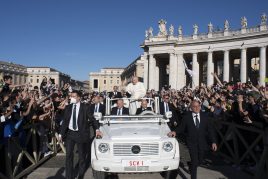 These boys and girls will still need us in the future. We must understand and wait patiently for them to come along. So let us go and reconnect with these young people, showing our love for them. We must love them with the awareness that we are far from perfect. Even us grown-ups are fragile. Young people help us keep our feet on the ground; they help us not to consider ourselves better than them, and not to assume the role of infallibility. That attitude does not pay off with the young.
These boys and girls will still need us in the future. We must understand and wait patiently for them to come along. So let us go and reconnect with these young people, showing our love for them. We must love them with the awareness that we are far from perfect. Even us grown-ups are fragile. Young people help us keep our feet on the ground; they help us not to consider ourselves better than them, and not to assume the role of infallibility. That attitude does not pay off with the young.





